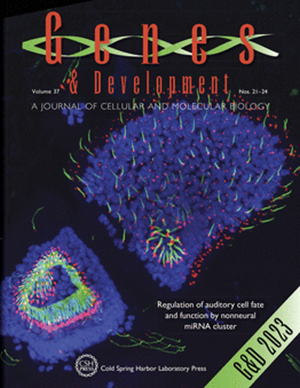Opposing lineage specifiers induce a protumor hybrid identity state in lung adenocarcinoma
IF 7.7
1区 生物学
Q1 CELL BIOLOGY
引用次数: 0
Abstract
Lineage plasticity is critical for tumor progression and therapy resistance, but the molecular mechanisms underlying cell identity shifts in cancer remain poorly understood. In lung adenocarcinoma (LUAD), the loss of pulmonary lineage fidelity and acquisition of alternate identity programs converge on hybrid identity (hybrid ID) states, which are postulated to be key intermediates in LUAD evolution and are characterized by the coactivation of developmentally incompatible identity programs within individual cells. Here, we uncover a previously unrecognized role for the gastrointestinal transcriptional regulator HNF4α in driving tumor growth and hybrid ID states in LUAD. In LUAD cells expressing the lung lineage specifier NKX2-1, HNF4α induces a GI/liver-like state by directly binding and activating its canonical targets. HNF4α also disrupts NKX2-1 genomic localization and dampens pulmonary identity within hybrid ID LUAD. We show that this hybrid ID state is maintained by sustained RAS/MEK signaling. Inhibition of the RAS/MEK signaling cascade augments NKX2-1 chromatin binding at pulmonary-specific genes and induces drug resistance-associated pulmonary signatures. Finally, we demonstrate that HNF4α depletion sensitizes LUAD cells to KRASG12D inhibition. Collectively, our data show that coexpression of opposing lineage specifiers is a novel mechanism of identity dysregulation in LUAD that influences both tumor progression and response to targeted therapy.相反的谱系指示因子诱导肺腺癌的原肿瘤杂交身份状态
谱系可塑性对肿瘤进展和治疗耐药性至关重要,但癌症中细胞身份转移的分子机制仍然知之甚少。在肺腺癌(LUAD)中,肺谱系保真度的丧失和替代身份程序的获得集中在混合身份(hybrid ID)状态,这被认为是LUAD进化的关键中间产物,其特征是单个细胞内发育不相容的身份程序的共激活。在这里,我们发现了胃肠道转录调节因子HNF4α在LUAD中驱动肿瘤生长和混合ID状态的先前未被认识的作用。在表达肺谱系指示物NKX2-1的LUAD细胞中,HNF4α通过直接结合和激活其规范靶点诱导GI/肝脏样状态。HNF4α也破坏NKX2-1的基因组定位,并抑制杂交ID LUAD中的肺身份。我们发现这种混合ID状态是由持续的RAS/MEK信号维持的。抑制RAS/MEK信号级联可增强NKX2-1染色质与肺特异性基因的结合,并诱导耐药相关的肺特征。最后,我们证明了HNF4α缺失使LUAD细胞对KRASG12D抑制敏感。总的来说,我们的数据表明,相反谱系说明因子的共表达是LUAD中身份失调的一种新机制,它影响肿瘤进展和对靶向治疗的反应。
本文章由计算机程序翻译,如有差异,请以英文原文为准。
求助全文
约1分钟内获得全文
求助全文
来源期刊

Genes & development
生物-发育生物学
CiteScore
17.50
自引率
1.90%
发文量
71
审稿时长
3-6 weeks
期刊介绍:
Genes & Development is a research journal published in association with The Genetics Society. It publishes high-quality research papers in the areas of molecular biology, molecular genetics, and related fields. The journal features various research formats including Research papers, short Research Communications, and Resource/Methodology papers.
Genes & Development has gained recognition and is considered as one of the Top Five Research Journals in the field of Molecular Biology and Genetics. It has an impressive Impact Factor of 12.89. The journal is ranked #2 among Developmental Biology research journals, #5 in Genetics and Heredity, and is among the Top 20 in Cell Biology (according to ISI Journal Citation Reports®, 2021).
 求助内容:
求助内容: 应助结果提醒方式:
应助结果提醒方式:


